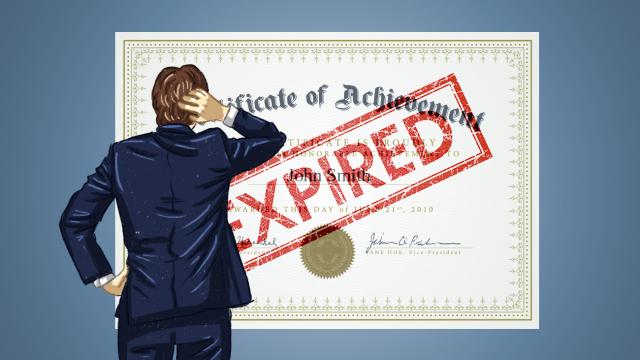Dear Lifehacker, I have a few professional certifications that I worked hard to get, but I changed careers and don’t use them anymore. They’re about to expire, and I’m wondering: Should I let them expire since I don’t work in that field anymore, or should I spend the time and money re-upping them so I stay current? Is it worth it? Thanks, Certifiable
Photos by romrf (Shutterstock), Mark Tighe, Lidyanne Aquino, and 143d ESC
Dear Certifiable,
We’ll say from the outset that the answer to this question is “It depends”. It depends heavily on the certifications you have, how much effort it took for you to get them, and whether you think you’ll ever need to fall back on them again in the future. In general though, if the time and effort is minimal, we say keep them up to date. If it’s a lot of effort, you might want to think twice. Let’s do a deeper dive and explain when it can benefit you to keep certs you don’t use relevant and current, versus when it’s not worthwhile.
Did Your Certification Help You Get Your Current Job Or Change Careers?

Just because you no longer use your professional certification in day-to-day life doesn’t mean it’s not valuable. For example, did your certification come in handy when you applied for or were interviewed for your current job? Even if you don’t think it’s directly applicable, any professional certification can give you an edge, and show that you have a broader knowledge set than someone else applying for the same job.
Letting your cert expire means that you may not be able to actually say you’re “certified” anymore, depending on the authority that certified you. Sure, you can say you had it at one point, but you won’t be able to claim you’re current. Even if you don’t think your certification helped you qualify for your current role, if it gave you an edge at all, it might help to keep it up to date, even if you’re not looking for a new job now, or planning to change careers again anytime soon.
For example, just because you’re an IT manager doesn’t mean you need to get your hands dirty anymore — your day is probably spent coordinating escalations, helping out your technicians, and dealing with paperwork and projects. However, letting basic certifications expire, even if you don’t use the skills required for them on a day to day basis, may make you less marketable in the future, even if you apply for managerial positions. However, there’s a difference between an entry-level, general certification like, for example, the CompTIA A+ and a specialised, advanced certification like RHCE (Red Hat Certified Engineer). When you weigh your options, make sure you’re not spending time and money re-upping a certification that’s too basic to be competitive. Save your money for the higher-end ones.
Do You Want To Be Able To Fall Back On Your Old Career?

You should also consider whether you ever plan to fall back on your old career. Even if you don’t “plan” to, if you think that it might be nice if your current job fell through, you should keep those old skills current. As an example, I’m a PMP (Project Management Professional), and while I don’t use it in my day-to-day as a writer, project management is a career that I know I can fall back on if something crazy happens. It’s also a specialised (and expensive) certification, so it makes more sense to keep it up to date.
You may never go back to your old career, but keeping the certifications that you worked so hard for forces you to stay semi-current in your old field (and proves that you are, in case anyone needs to know), and it gives you a competitive edge if you ever need a job in your old field. That credential may mean the difference between landing an interview or having to explain why you’re competitive even though you’ve been out of the field for so long.
Did You Spend A Good Amount of Money Or Time Getting The Certification?

The amount of time and money you spent to get certified plays a role here as well. Even if the money wasn’t yours — let’s say your employer paid for training or a certification course — you should still consider your bottom line. If you’d have to spend all of that money again on your own (or convince an employer to pay for it again), you’re probably better off keeping your certification current. Training classes and certification exams can add up to thousands of dollars, especially as you get to more specialised and career-defining credentials. Plus, those courses can be weeks or months long, and require multiple exams. If you spent six months taking classes that led up to two thousand-dollar exams, don’t take that expiration date lightly. On the other hand, if your certification was really a $50 test that you didn’t bother studying for, don’t stress out over every new edition. If you need it, you can always go and renew it.
Does The Certification Offer Other Perks And Benefits?

Finally, consider whether or not your credential gives you access to other perks and benefits that you may or may not be using. Those things have value — even if you’re not taking advantage of them — and you should consider them before you let your credential lapse. Many professional certifications grant you access to professional societies and local chapters that offer opportunities for professional networking or even job prospects. In some cases, there are additional training courses and insider events that are only open to certified engineers, professionals, or other members of that society. Many of my colleagues at my last job were privy to conferences hosted by the professional societies of which they were members, where companies showcased new technologies to certified engineers who could experiment and evaluate them. My certification gives me access to local events and conferences where other PMs get together to trade stories and share expertise.
Similarly, it’s important to remember that most professional societies have open directories of members and credential-holders. While inclusion in them is optional, many employers will check those registries for local candidates with credentials they need. It’s nice to get contacted by a potential employer because of your registry entry — even if that employer would never have found you otherwise.
We hope these tips help you out a bit, Certifiable. Depending on your career and the type of certification you hold, it may be a good idea to stay current. It will make you marketable, and it may open the doors to other opportunities you hadn’t thought of already.
However, if your certification is a general one, or something you can get again later should you ever actually need it, you may save yourself the hassle and instead just choose to stay current in your field, as opposed to stay current with the credential. Weigh your options carefully and make the call that’s best for you, your career, and of course, your wallet.
Cheers
Lifehacker
Got your own question you want to put to Lifehacker? Send it using our [contact text=”contact form”].

Comments
2 responses to “Ask LH: Should I Let A Certification Expire If I Don’t Work With It Anymore?”
If you are very sure of your future in your current situation, you can let go of the certificates.
I guess it’s time to take my Windows 95 MCP off the old resume then?